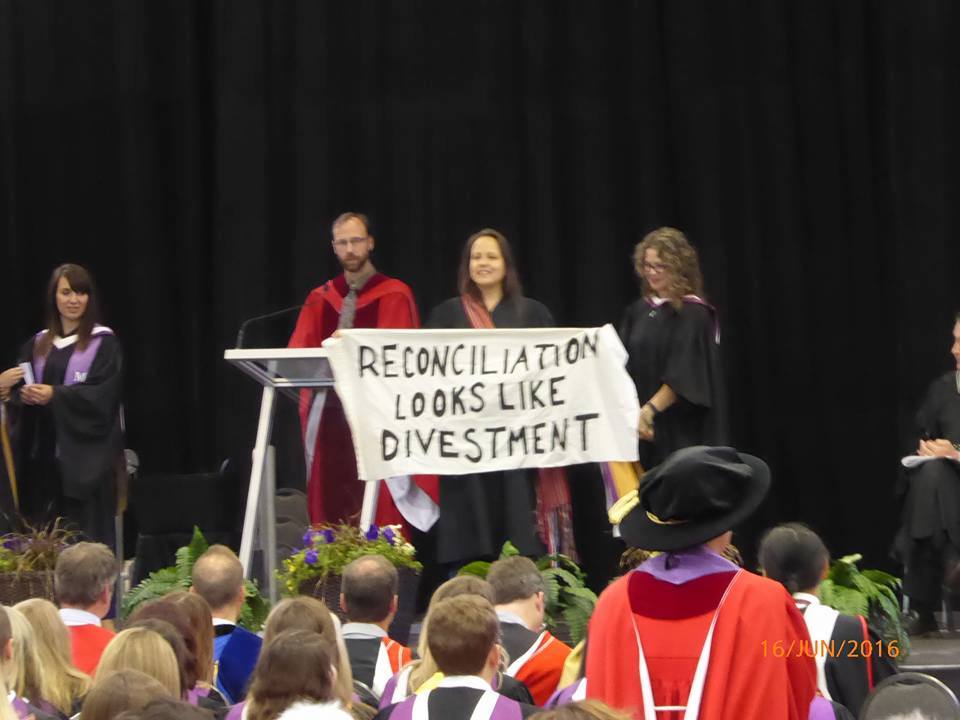Like this article? rabble is reader-supported journalism. Chip in to keep stories like these coming.
A few weeks ago, I picked up my father and started driving north. We were on our way to my graduation. I turned down the stereo, handed him a bag, and told him to open it. When he did, it he found my Métis sash and a banner and shot me a suspicious look. I said, “I’m sorry if this is a big day for you, but I have something I need to do.”
It was not a very hard decision to use my convocation as a platform to send a message. Graduation from university is an accomplishment, but it is also a privilege. Recognizing the privileges we are afforded and utilizing them in the service of social justice is a beautiful thing. While my graduation provided me with opportunity, it was also an opportunity in and of itself. It was an audience of future change-makers and high-ranking university administration.
As I sat nervously in my seat, a banner folded up under my arm for over an hour, I watched my fellow students and marked the exact timing I would need to act in order to not steal the spotlight from any other graduates. As I approached the stage, I undid my gown and threw my sash over shoulder. I handed off my purple and gold academic hood and took a step forward, pulling my banner out from underneath my gown.
RECONCILIATION LOOKS LIKE DIVESTMENT
I shouted across the crowd: “Extractive industry is an active threat to the survival of Indigenous people. Solidarity with Aamjiwnaang, Chippewas of the Thames, and land defenders across Turtle Island!”
Although I was met with shining grins by most of the faculty I had worked under for the last few years, I knew there would be some who disapproved of my statement. Divestment from fossil fuels is not a popular topic.
I know that linking reconciliation between settlers and Indigenous people — an idea brought center stage in universities since the Truth and Reconciliation Commission recently released — would be controversial. I do not purport to speak for all Indigenous people. It is true there are some who would rather see funds redirected from extractive industry as reparations rather than demand a complete withdrawal. While I respect the autonomy and agency of those individuals and communities, I also hold myself accountable to what I believe in my heart to be right.
It is hard for me to take seriously the sentimental commitment of university officials to reconciliation while their institution is invested in and profiting from corporations actively involved in the poisoning of land and water connected to Indigenous communities. I took this action in solidarity with the Chippewas of the Thames First Nation, which is currently engaged in a Supreme Court challenge against Enbridge and their Line 9, because fossil fuel companies act with impunity in their disregard of treaties and the danger they force onto frontline communities.
I took this action in solidarity with ASAP and Aamjiwnaang because corporate policies of environmental racism have resulted in a territory surrounded on all sides by toxic industrial facilities — with names like Suncor and Shell — resulting in skewed sex ratios among children and skyrocketing rates of cancer and respiratory illness.
I took this action in solidarity with Athabasca Chipewyan First Nation who refused to continue participating in stacked hearings with TransCanada and chose instead to prioritize the health of the plants and animals being poisoned by runoff from the Alberta Tar Sands.
I took this action in solidarity with land defenders across Turtle Island — from Unist’ot’en to Sarnia — putting their lives and their freedom at risk by taking direct action against extractive industry. If they are willing to lose those things, the least I should be willing to lose is my graduation photo-op.
Divestment is a tricky issue. Many liberals see it as the best way to deal blows to the fossil fuel industry, by working inside the system and using the markets against them. On the other side, radicals see it as condonation of the inherently oppressive market system that got us in this mess in the first place by valorizing unrelenting growth and greed.
I do not believe that the markets hold the solutions to our climate crisis. I do not believe that divestment is the answer to our problems. I do believe that, at this critical juncture, we need to start truly embracing the full diversity of tactics at our disposal.
We need to support other movements, even when we are not prepared to take those actions ourselves, and relish in the understanding that our collective actions have the power to overwhelm the system. I also believe that, while settlers must take care not to essentialize Indigenous people as Loraxian extensions of nature who “speak for the trees,” reconciliation involves understanding the connection that Indigenous people have to the land. The connection Indigenous women have to the water. They have to acknowledge that when fossil fuel industries poison those things, they rob Indigenous people of the ability to survive in any meaningful way.
In order to reconcile the relationship between Indigenous people and settlers, the attack on their ways of life have to stop first. If universities are serious about their commitments to this reconciliation, a good step is to stop profiting off the corporations responsible for these acts of aggression. They need to look at divestment.
Jaydene Lavallie is a queer Red River Metis woman, living in Dish with One Spoon territory of Hamilton, Ontario.
Like this article? rabble is reader-supported journalism. Chip in to keep stories like these coming.



